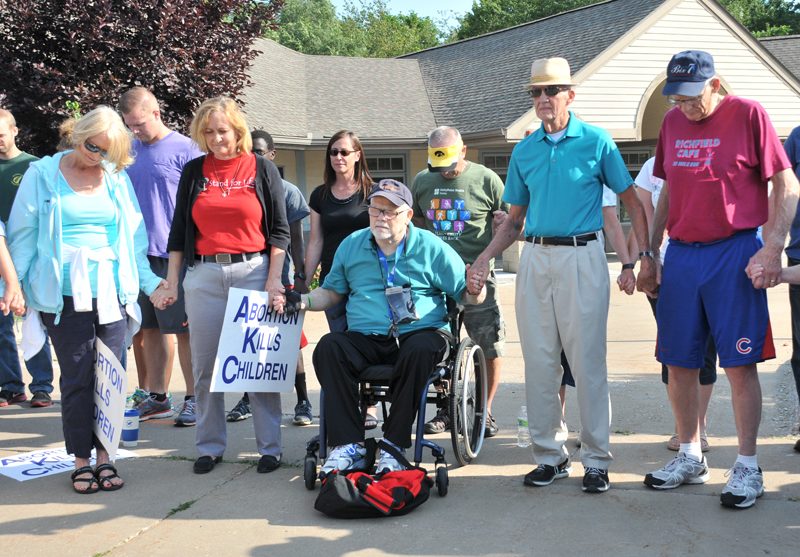By Tom Chapman
For The Catholic Messenger
Legislation that would defund facilities where abortions are performed, eliminate many regulations regarding guns in Iowa, and reinstate the death penalty are among bills being considered in the Iowa Legislature. These and other bills of interest to Catholics and all Iowans are required to pass their first committee by Friday to remain eligible, with the exception of bills related to budget or taxes.

Pro-life supporters pray outside the Planned Parenthood clinic in Bettendorf during a national day of prayer in 2015. The Iowa Legislature is considering a bill that would affirm that life begins at conception.
• Senate File 2 sets up a replacement for a current federal- and state-funded family planning program. The new program, however, would not distribute funds to organizations that perform abortions or maintain or operate a facility where abortions are performed. The Iowa Catholic Conference (ICC) believes that public funds should not subsidize the abortion business when there are many other health care providers available. Some legislators in the House would like to wait and accomplish this through the budget process but we would like to see the bill pass.
• House Study Bill 133 eliminates many regulations regarding guns in Iowa. The Catholic Church has been a strong advocate for the reasonable regulation of firearms. Unfortunately, HSB 133 expands Iowa’s “Castle Doctrine.” Currently, there is no “duty to retreat” in the face of any perceived threat in your home or place of business in Iowa. HSB 133 removes any duty to retreat anywhere. Catholic moral teaching recognizes the right to self-defense.
However, the use of deadly force cannot be considered necessary if the person can escape. We have a moral obligation to try to not use deadly force. We believe this section of HSB 133 moves Iowa farther away from the moral principle of “You shall not kill.”
In regard to gun violence prevention, the U.S. bishops wrote in 2000, “We support measures that control the sale and use of firearms and make them safer (especially efforts that prevent their unsupervised use by children or anyone other than the owner), and we reiterate our call for sensible regulation of handguns.” You can check out our action alert for further information.
• Senate Files 335 and 336 would reinstate the death penalty in Iowa. The Iowa Legislature abolished the death penalty in 1965.The state already imposes a life sentence without the possibility of parole for murderers.
Catholic teaching on human life is rooted in the belief that all life is a gift from God that must be respected and defended from conception to natural death. The Catholic Church teaches that the use of the death penalty is unnecessary in today’s society. The Catholic bishops in the United States have been calling for an end to the use of the death penalty for decades
As Pope Francis has said: “Nowadays the death penalty is inadmissible, no matter how serious the crime committed. It is an offense against the inviolability of life and the dignity of the human person, which contradicts God’s plan for man and society, and his merciful justice, and impedes the penalty from fulfilling any just objective. It does not bring justice to the victims, but rather fosters vengeance.”
• The ICC seeks an increase in the minimum wage in Iowa. It’s currently set at $7.25. So far, the only legislation moving on this issue would forbid cities and counties from raising the minimum wage on their own. The minimum wage in Iowa has fallen behind other nearby states; for example, Nebraska has a minimum wage of $9 per hour. Even with relatively minimal inflation, the years since the last increase in 2007 have eroded the value of the wage.
• House File 265 would prohibit any local or state agency from taking actions that limit the enforcement of federal immigration law to less than the full extent allowed by law.
This bill would promote local law enforcement of federal immigration laws without accounting for the current relationships of trust between Iowa law enforcement and immigrant communities. This could undermine public safety by making immigrants scared of cooperating with local law enforcement.
Several other bills of interest are moving in the legislature.
• A subcommittee meeting was held Feb. 27 for Senate File 253, a “life at conception” bill. The ICC agrees with the moral principle that life begins at conception, and also with the goal of the bill – to stop abortion. However, we don’t believe the bill is likely to stand up in court, possibly leading to another reaffirmation of state or federal abortion rights. That being said, prudential judgment is involved and Catholics could legitimately decide that this bill is a good idea or not.
• At press time a subcommittee meeting was to be held to consider Senate File 53. SF 53 would prohibit abortions 20 weeks post-fertilization. Several states have adopted similar bills. Iowa’s current prohibition of abortions after the second trimester is unenforceable because of an exception which allows abortions to preserve the life and health of the mother. In practice, the physician defines what “health” means.
• Senate File 52, which passed the Senate Human Resources Committee last week, would stop the transfer or sale of fetal tissue in Iowa after an abortion. Two issues are involved with this bill. The first is abortion itself: a direct attack on human life during its most vulnerable time. The second is a longstanding practice of obtaining fetal organs and tissues through abortion.
• House File 223 would prohibit any agency of the state from considering any “law, legal code or system” which does not grant the same rights as the U.S. or Iowa Constitutions. The Iowa Catholic Conference opposes House File 223 due to its possible impact on the application of Catholic canon law in the state. The legislation raises the question of interference with the internal life of the Catholic Church in such areas of the appointment of pastors, the closing of a parish or decisions by church tribunals regarding marriage.
• The ICC opposes Senate File 172. The bill addresses the immigration issue in Iowa by providing for the mandatory use of the federal “E-Verify” system. It also requires county attorneys or the state attorney general to investigate all complaints, anonymous or not, about the employment of unauthorized aliens. We believe we have a Scriptural obligation to “welcome the stranger” and support merciful public policies that help immigrants provide for families.
• While SF 172 does not permit racial profiling, there are no true safeguards against it. There is no way for the county attorney or state attorney general to know if the allegation stems from racial profiling or not.
Enforcement efforts alone, pursued by our government for years, have not solved the problem of illegal immigration. As the bishops of Iowa said in a statement on immigration, “We urge that Iowans – remembering our own history as immigrants — work constructively towards a compassionate resolution of this problem at the federal level.”
• House File 196 would allow a new category of lenders to charge up to 17 percent interest a month for loans between $500 and $2,500. We are concerned about the bill because of its possible impact on poor or vulnerable people. It sets up yet another type of “payday-type” loan in Iowa with excessive rates. Lending practices that, intentionally or unintentionally, take advantage of one’s circumstances are unjust.
• House Study Bill 93 would require a government-issued ID and signature verification for voters. There is not a particular “Catholic position” on how the government should run elections. However, our participation in public life through the right to vote is extremely important and should not be withheld without reason. There is little evidence of voter fraud in Iowa. Voter impersonation is virtually non-existent.
• HSB 93 contains provisions for homeless people and low-income people to receive IDs. One concern is making sure the state actually appropriates money to pay for IDs for those who can’t afford one. In addition, the bill cuts off absentee voting mail requests at about 10 days out from the election, rather than four.
• The ICC supports House File 376, which would require employers to provide reasonable accommodations to employees based on pregnancy or childbirth, as long as the action would not impose an “undue hardship” on the business.
For more information on issues and action alerts, go to the ICC’s website:iowacatholicconference.org. Send a message to your legislator by visiting the ICC Action Center at votervoice.net/icc/home.











